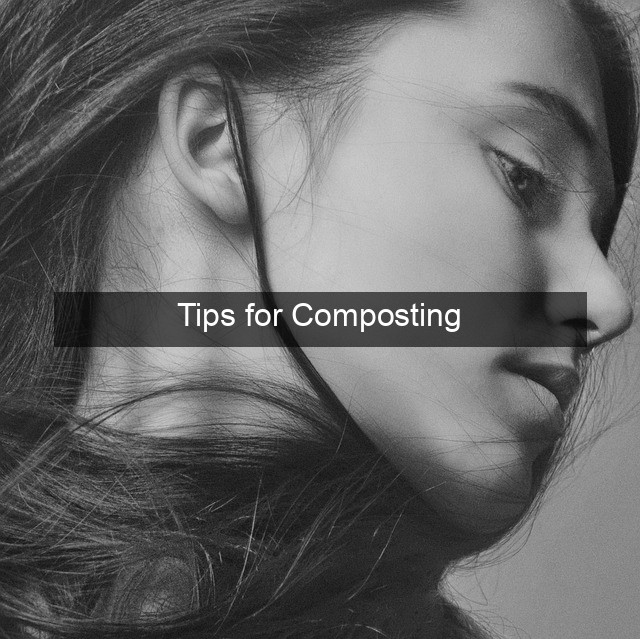Tips for Composting

- Tips for Composting
- Transform Your Waste: A Comprehensive Guide to Composting
- Getting Started with Composting
- Choosing the Right Compost Bin
- Understanding the Compost Ingredients
- Building Your Compost Pile
- Maintaining and Troubleshooting Your Compost
- Turning and Watering
- Troubleshooting Common Problems
- Using Your Finished Compost
- Conclusion
- Frequently Asked Questions
- What can I compost?
- How long does it take to make compost?
- Why is my compost pile smelly?
- How often should I turn my compost?
- What is the ideal carbon-to-nitrogen ratio for composting?

Transform Your Waste: A Comprehensive Guide to Composting
Imagine turning your kitchen scraps and yard waste into nutrient-rich “black gold” for your garden. Composting is not just an eco-friendly practice; it’s a rewarding way to enrich your soil, reduce landfill waste, and connect with the natural cycle of decomposition. Whether you’re a seasoned gardener or a beginner, this guide offers practical tips and insights to help you master the art of composting, from setting up your compost bin to troubleshooting common issues. Composting can seem daunting at first, but with a little knowledge and effort, you’ll be well on your way to creating a thriving compost pile and a flourishing garden.
Getting Started with Composting
Choosing the Right Compost Bin
Selecting the right compost bin depends on your space and composting style. Tumblers are ideal for small spaces and require less turning. Open bins offer more flexibility for larger volumes of material. DIY bins can be constructed from readily available materials like pallets or wire mesh. Consider your needs and available space when making your choice.
Another aspect to consider is the material of the bin. Plastic bins are lightweight and affordable. Wooden bins blend in nicely with a garden setting. Metal bins are durable but can heat up quickly in direct sunlight. Each material has its pros and cons, so research carefully.
Finally, think about the accessibility of your bin. Choose a location that is convenient for adding materials and turning the compost. A readily accessible bin encourages regular maintenance and simplifies the composting process.
Understanding the Compost Ingredients
Composting relies on a balance of “greens” (nitrogen-rich materials) and “browns” (carbon-rich materials). Greens include fruit and vegetable scraps, coffee grounds, and grass clippings. Browns include dried leaves, twigs, and shredded paper. A proper ratio of these materials is crucial for successful decomposition.
The ideal carbon-to-nitrogen ratio is generally considered to be around 30:1. This doesn’t require precise measurement, but aiming for a good mix of brown and green materials will ensure a healthy compost pile. Too many greens can lead to a slimy, smelly mess, while too many browns can slow down the decomposition process.
Remember to avoid adding meat, dairy products, oily foods, or diseased plants to your compost bin. These materials can attract pests, create unpleasant odors, and potentially introduce harmful pathogens to your compost.
Building Your Compost Pile
Layering your compost materials like a lasagna is key to effective decomposition. Start with a layer of coarse brown materials for aeration, followed by a layer of green materials. Continue layering, alternating between browns and greens, like building a layered cake. This promotes air circulation and even decomposition.
Moisten each layer as you add it, ensuring the compost is damp like a wrung-out sponge. Too much moisture can lead to anaerobic decomposition and unpleasant smells. Too little moisture will slow down the composting process. Proper moisture is essential for microbial activity.
Turning the compost pile regularly helps to aerate the materials and speed up decomposition. Use a pitchfork or compost aerator to mix the layers every few weeks. This ensures even decomposition and prevents the pile from becoming compacted and smelly.
Maintaining and Troubleshooting Your Compost
Turning and Watering
Regular turning is crucial for introducing oxygen into the compost pile. Aim to turn your compost every one to two weeks, using a pitchfork or aerator to mix the materials thoroughly. This ensures even decomposition and prevents anaerobic conditions.
Maintain consistent moisture levels by watering the pile when it feels dry. The compost should be damp like a wrung-out sponge. Avoid overwatering, as this can lead to anaerobic decomposition and unpleasant odors.
Monitor the temperature of your compost pile. A healthy compost pile will heat up significantly during the initial stages of decomposition. This heat is essential for breaking down organic matter and killing weed seeds and pathogens.
Troubleshooting Common Problems
A common composting issue is unpleasant odors. This is often caused by excessive moisture or an imbalance of green materials. Turning the pile and adding more brown materials can help to alleviate this problem.
Slow decomposition can be caused by insufficient moisture, a lack of nitrogen, or cold temperatures. Adding water, green materials, or an activator can help speed up the process.
Pest infestations can be prevented by avoiding adding meat, dairy, and oily foods to the compost. If pests do appear, cover the pile with a layer of brown materials to deter them.
Using Your Finished Compost
Finished compost is dark, crumbly, and has an earthy smell. It can take anywhere from a few months to a year for compost to mature, depending on the materials and composting method used.
Use your finished compost as a soil amendment to improve soil structure, fertility, and water retention. Mix it into garden beds, use it as a top dressing for lawns, or add it to potting mixes.
Composting is a continuous cycle. Once you’ve used your finished compost, you can start a new pile with fresh materials. This sustainable practice benefits your garden and the environment.
Conclusion
Composting is a rewarding and environmentally friendly practice that transforms kitchen scraps and yard waste into valuable garden gold. By following these tips and understanding the basic principles of decomposition, you can create a thriving compost pile and enrich your garden with nutrient-rich humus. Embrace the cycle of nature, reduce your environmental impact, and enjoy the fruits (and vegetables!) of your composting labor.
Remember that composting is a journey, not a destination. Don’t be discouraged by occasional setbacks. With patience and persistence, you’ll become a composting pro in no time. Enjoy the process of transforming your waste into a valuable resource for your garden and the planet.
Frequently Asked Questions
What can I compost?
You can compost a wide variety of organic materials, including fruit and vegetable scraps, coffee grounds, tea bags, eggshells, yard waste, shredded paper, and cardboard. Avoid composting meat, dairy, oily foods, and diseased plants.
How long does it take to make compost?
The composting process can take anywhere from a few months to a year, depending on the materials used, the composting method, and the environmental conditions.
Why is my compost pile smelly?
A smelly compost pile is often a sign of excessive moisture or an imbalance of green materials. Turn the pile and add more brown materials to improve aeration and reduce odors.
How often should I turn my compost?
Turning your compost every one to two weeks helps to aerate the materials and speed up decomposition.
What is the ideal carbon-to-nitrogen ratio for composting?
The ideal C:N ratio is generally considered to be around 30:1. Aim for a good mix of brown and green materials to achieve this balance.
| Material Type | Examples | C:N Ratio (Approximate) |
|---|---|---|
| Greens (Nitrogen-rich) | Grass clippings, fruit/vegetable scraps, coffee grounds | 15-20:1 |
| Browns (Carbon-rich) | Dried leaves, shredded paper, wood chips | 300-500:1 |
- Choose the right compost bin for your space and needs.
- Maintain a proper balance of green and brown materials.
- Turn your compost regularly to ensure proper aeration.
- Monitor moisture levels and adjust as needed.
- Be patient and enjoy the process!



